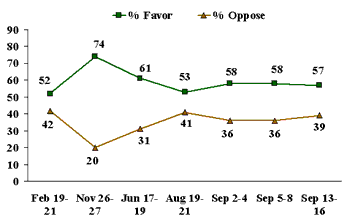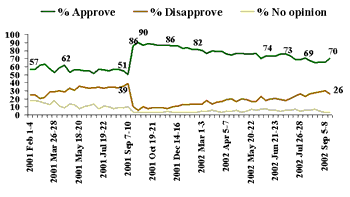GALLUP NEWS SERVICE
PRINCETON, NJ -- The American public is strongly behind President George W. Bush's efforts to push the United Nations into taking a more forceful position against Iraq and its leader, Saddam Hussein. A just-completed CNN/USA Today/Gallup Poll shows that Americans overwhelmingly want the U.N. to take a tougher stance against Iraq, to pass a resolution demanding compliance with weapons inspections efforts, and to authorize military action if Iraq does not comply. More than seven in 10 Americans feel that Saddam Hussein will use weapons of mass destruction against the United States if military action is not taken. President Bush's job approval rating is now at 70%, marking the first time since late July that it has been at that level or higher.
Support for United Nations Actions
The Sept. 13-16 poll reflects general public approval for the policies enunciated by President Bush in his highly publicized speech at the United Nations last Wednesday.
Specifically,
1. The American public overwhelmingly endorses Bush's position that the U.N. has not been tough enough in dealing with Saddam Hussein and Iraq.
Do you think the United Nations -- [ROTATED: has been too tough, has been about right, or has not been tough enough] -- in dealing with Iraq?
|
|
|
Not tough enough |
No |
|
|
2002 Sep 13-16 |
2% |
15 |
80 |
3 |
2. The American public almost universally supports the proposal of a new U.N. resolution that imposes a deadline on Iraq to submit to weapons inspections.
Do you think the United Nations should -- or should not -- pass a resolution that imposes a deadline on Iraq to submit to weapons inspections or face grave consequences?
|
Yes, should |
No, should not |
No opinion |
|
|
2002 Sep 13-16 |
93% |
5 |
2 |
3. When given an explicit choice between taking military action and engaging in further diplomatic action if Iraq fails to meet such a deadline, a majority of the American public agrees with the administration position that military action would be necessary:
If the United Nations does impose a deadline on weapons inspections and Iraq fails to meet it, what should the United Nations do -- [ROTATED: authorize military action against Iraq, (or) engage in further diplomatic efforts with Iraq]?
|
Military action |
Diplomatic efforts |
No opinion |
|
|
2002 Sep 13-16 |
61% |
35 |
4 |
In short, the public agrees strongly that the United Nations should take a tougher stance against Iraq, that the U.N. should issue a resolution calling for Iraqi submission to weapons inspections, and that the U.N. should follow up with military action if Iraqi compliance is not forthcoming.
But the latest poll results also show that the public's reaction to a more basic question asking explicitly about the United States' use of ground troops to remove Saddam Hussein from power has stabilized at the 57% level. This is roughly where it has been since the beginning of September. (At the same time, a slightly higher 65% favor military action to prevent Iraq from developing weapons of mass destruction, but not necessarily removing Saddam Hussein from power.)
| Would you favor or oppose sending American ground troops to the Persian Gulf in an attempt to remove Saddam Hussein from power in Iraq? |
 |
The fact that there has been no increase in the percentage of Americans willing to green light U.S. military action may be due to the increased significance of the United Nations to the American people.
Most polling, conducted both in recent months and during the build-up prior to the Persian Gulf War in 1990 and early 1991, showed that Americans wanted Allied and U.N. involvement in any U.S. decision to go to war. In an early September 2002 poll, almost seven out of 10 Americans thought it was necessary for the Bush administration to get a resolution of support from the United Nations before proceeding with plans to attack Iraq.
Thus, it is not surprising that an additional question included in the latest poll shows that only a little more than a third of the public would endorse U.S. military action if the U.N. opposes it. Another 46% would support U.S. military action if the U.N. endorsed it, bringing the total percentage of the American public that would support U.S. military action -- if the U.N. endorses it -- to over 80%.
Which comes closest to your point of view about sending U.S. ground troops to Iraq -- [ROTATED: the United States should send ground troops to Iraq only if the United Nations supports that action, the United States should send ground troops to Iraq even if the United Nations opposes that action, or the United States should not send ground troops to Iraq at all]?
|
Send only if |
Send even if |
|
No |
|
|
2002 Sep 13-16 |
46% |
37 |
14 |
3 |
Would Saddam Hussein Use Weapons of Mass Destruction Against the United States?
Previous Gallup polling has shown that Americans believe there are two major reasons for taking military action against Iraq: The perception that Saddam Hussein is supporting terrorism, and the perception that he has or is building weapons of mass destruction. In this poll, Americans were asked if they thought that Hussein would eventually deploy "weapons of mass destruction, such as biological, chemical, or nuclear weapons against the United States" if military action is not taken. Almost three-quarters of Americans said yes, although about half of those respondents felt that it would be five years or more before that occurred.
If the United States does not take military action against Saddam Hussein, do you think he will or will not eventually use weapons of mass destruction, such as biological, chemical, or nuclear weapons, against the United States? (Respondents who answered in the affirmative to above question then asked): Do you think Saddam Hussein would use these weapons -- within the next six months, within the next year, within the next five years, within the next ten years, or longer than that?
|
2002 Sep 2-4 |
||
|
% |
||
|
Yes, will eventually use weapons of mass destruction against the U.S. |
72 |
|
|
Within the next six months |
(11) |
|
|
Within the next year |
(19) |
|
|
Within the next five years |
(33) |
|
|
Within the next 10 years |
(3) |
|
|
Longer than 10 years |
(1) |
|
|
Unsure |
(5) |
|
|
No, will not eventually use weapons of mass destruction against the U.S. |
22 |
|
|
No opinion |
6 |
|
Bush Job Approval
President Bush's job approval rating has increased slightly as measured in this latest poll, and is now at 70%.
| George W. Bush's Job Approval Rating |
 |
In mid-July, the president's job approval fell below 70% for the first time since the Sept. 11 terrorist attacks, and reached a low point (since 9/11) of 65% in the Gallup Poll of Aug. 19-21. After stabilizing in early September at 66%, the president's job approval number, as noted, has now rebounded to 70%.
Job approval ratings are dynamic by nature, responding to both short-term presidential actions and media coverage, as well as long-term, fundamental shifts in underlying assessments of the president. A change of four points (as evidenced by the change in Bush's score since the last Gallup Poll earlier in September) is not unusual nor highly significant. Bush's rating jumped by four points in early June, and rose by three points between two polls conducted in March, for example. Still, the interesting phenomenon here is the stabilization of Bush's job approval rating in the month of September.
Two issues are most likely helping create this mini-rally effect as reflected in these job approval numbers -- the Iraq situation, including Bush's strong stance against Iraq and his speech to the United Nations last week, and the highly visible presence of the president at events surrounding the Sept. 11 anniversary.
The power of these international events in helping to shape the public's positive perceptions of Bush is underscored by Americans' recent ratings of the economy, which continue to be negative. Thus, absent the impact of major international issues, we would expect job approval ratings to be quite a bit lower than they are, given this perceived anemic state of the economy.
Summary
All in all, Americans strongly support the president's call for United Nations action regarding Iraq. While a majority generally supports the use of American ground troops to remove Saddam Hussein from power, it is clear that support levels would drop if the United Nations took a clear stance against such action. With U.N. support, however, the approval for use of U.S. ground troops soars. And it appears that the president's strategy on the Iraqi situation -- so far -- has resonated with the American people, whose approval for the way Bush has handled his job has gone up, not down, over the last week.
Survey Methods
The latest results are based on telephone interviews with 803 national adults, aged 18+, conducted Sept. 13-16, 2002. For results based on the total sample of national adults, one can say with 95% confidence that the margin of sampling error is ±4 percentage points. In addition to sampling error, question wording and practical difficulties in conducting surveys can introduce error or bias into the findings of public opinion polls.
